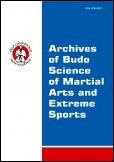2015, Volume 11, Issue 1
Effect of tai chi on the glucose and functional fitness level among elderly men with hyperglycemia
Janusz Maciaszek1, Wiesław Osiński1
1University School of Physical Education in Poznań, Poznań, Poland
Author for correspondence: Janusz Maciaszek; University School of Physical Education in Poznań, Poznań, Poland; email: jmaciaszek[at]awf.poznan.pl
Full text
Abstract
Background and Study Aim: The results of epidemiological studies suggest that diabetes is significantly more frequent amongst physically inactive individuals and rarely develops in active subjects. We analyzed the effect of tai chi on individuals with elevated level of glucose.
Material and Methods: The participants (25 men aged 61 to 79 years) were randomly assigned to the experimental – “E” (n = 10 with hyperglycemia) or control – “C” group (n = 15 right level of blood glucose). Men from “E” group had reported hyperglycemia and “C” group had normal level of glucose. Every subjects participated in an 18-week exercise class held twice a week. The level of glucose was measured using Cormay tests. Lower body strength, aerobic endurance and dynamic balance was measured on the basis of tests from the Senior Fitness Test.
Results: The reduction in the level of glucose (from 159.0 mg/dl to 133.4 mg/dl) observed in group “E” was likely a consequence of increased uptake of this sugar by skeletal muscles. Also the results of all three tests of functional fitness (chair stand, 2-Min Step and 8 foot up and go) markedly improved in both groups (main effect from F = 21.0 to F=66.6; p≤0.01).
Conclusions: The proposed training regimen met our expectations and, therefore, we can conclude that tai chi can improve the components of health and physical function in men with hyperglycemia. In patients with hyperglycemia, glucose was decreased (among healthy subjects did not change) and muscle strength, endurance, and dynamic balance increased as in healthy after training.
Key words: balance, endurance, Senior Fitness Test, strength





